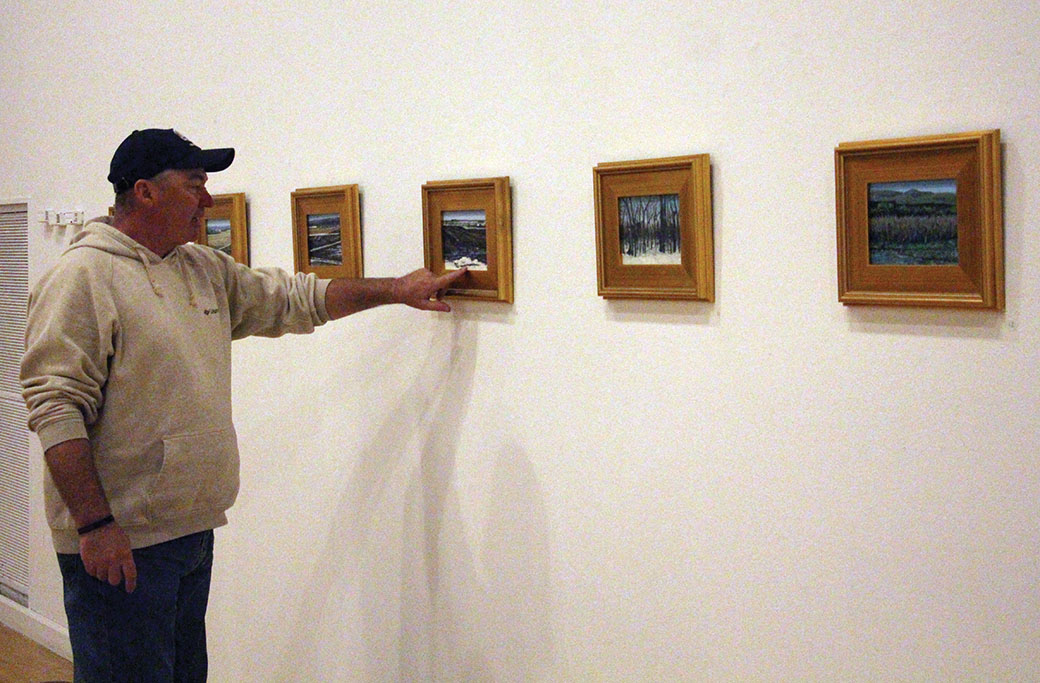
Art professor reflects on art exhibition, teaching
One USD art professor utilized his time off to create what he loves most.
Michael Hook, associate professor and an art foundations coordinator, has been teaching at USD for 11 years.
Last year, Hook went on a sabbatical to work on his art.
“I decided that after being here 10 years, I wanted to take a semester for myself and get into making some artwork without the grind or ritual of teaching, being in the classroom, grading and all of that stuff,” he said. “So I had an opportunity to just go to this artist residency and so I thought I was going to apply for this sabbatical so I could have the opportunity to travel to Wyoming.”
Hook was in Wyoming for five weeks for his Jentel Artist Residency, which he said really gave him the opportunity to explore and focus on his art.
Some of the artwork he made during that time is currently on display in the John A. Day Gallery in the Fine Arts building. The gallery includes acrylic and oil paintings and a video he produced.
Hook’s exhibition, called “Lessons in Landscape: Perception to Abstraction,” will be on display until March 31. On that Friday, there will be a closing reception from 6 to 8 p.m.
Hook said all the artwork was made in 2016 and most of the oil paintings were made during his sabbatical.
“I probably made some 60 pieces during the time and these are the 40 pieces that I thought were the strongest out of the bunch,” he said.
As for the video Hook produced, he said he didn’t know what he wanted it to be about until he took a sabbatical.
“We as artists, we make art while not really making art,” he said. “Just going on a drive and you look out and think of something as a painting or piece of artwork.”
Keith Braveheart, a second-year graduate student, said in an email that Hook’s artwork, specifically the pieces in the exhibition, “presents a sincere example of finding that relationship between foundation and appreciation for every detail or moment life gifts one.”
Braveheart said that while he hasn’t had the opportunity to take any of Hook’s classes, he has visited with Hook and listened to his philosophy as a professor of art.
He said he’s been able to learn more from his participation in critiques with Hook.
“As another artist appreciative of this expansive world, I find the greatest value from Hook in recognition of critical thought related to art and life,”
Braveheart said.
In the classroom
Hook thinks art is about sharing and making art is about communicating. To him, art is a community, he said.
“A lot of the time artists, especially students, don’t exactly know what they are trying to communicate, but they are communicating. You can’t help it,” Hook said. “Many times when somebody looks at your work, they’re going to get something out of it. I like art because it’s a way of communicating art humanity and a way of communicating in our community.”
Hook said he didn’t think about becoming an artist until he was at Columbia College.
“I got in with a bunch of people in class and met friends that were like-minded, finally, and that helped me decide what I wanted to do,” Hook said. “I think it was really more of a social decision than a personal decision.”
As for his job as an art professor, Hook said the number one thing he likes about it is the energy he gets from young people.
“I get excited about what they’re excited about and I see them learn and grow in a short amount of time,” he said. “That’s really rewarding.”
Energy is also something Braveheart has noticed in Hook.
“Michael Hook brings an energy built on his experiences lived outside the classroom, which I think is beautiful,” Braveheart said. “He truly has an ability to see the world as an artist sees it.”
One thing Hook often tells his students is that if they really love art, it will show them what to do and where to go.
“I think a lot of times people get stuck and they wonder if they made the right decision,” Hook said. “Students will question if they’re really good enough to be an artist or they compare themselves to other people. I tell students that you really have to only compare your work to your previous work. If they have an absolute desire to do this, then follow it.”

